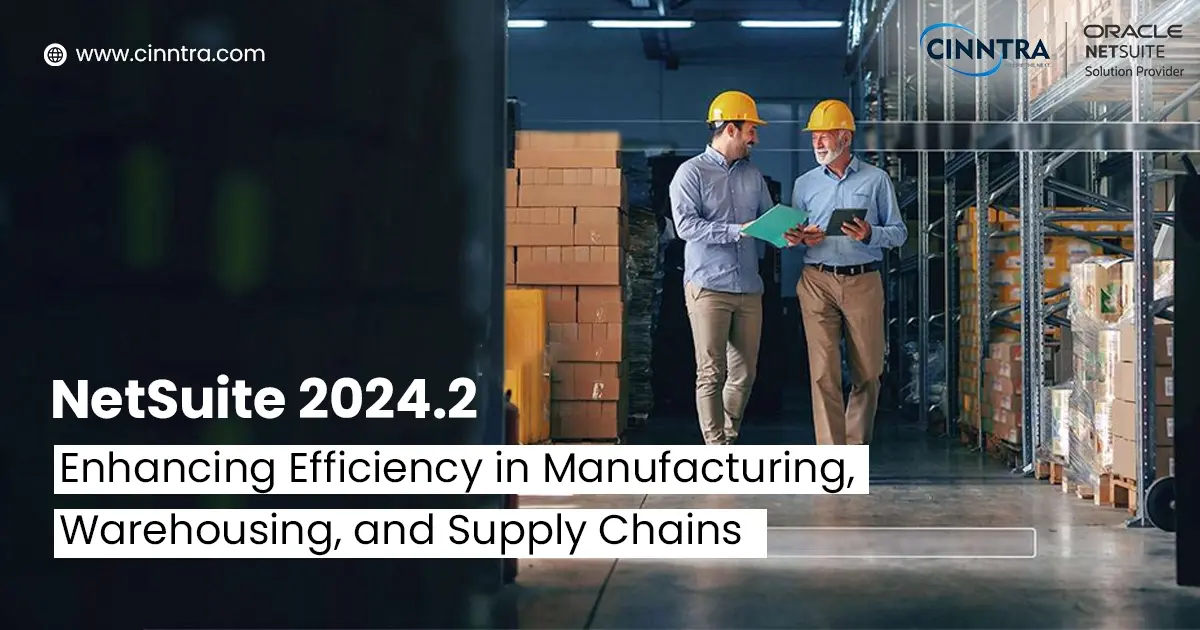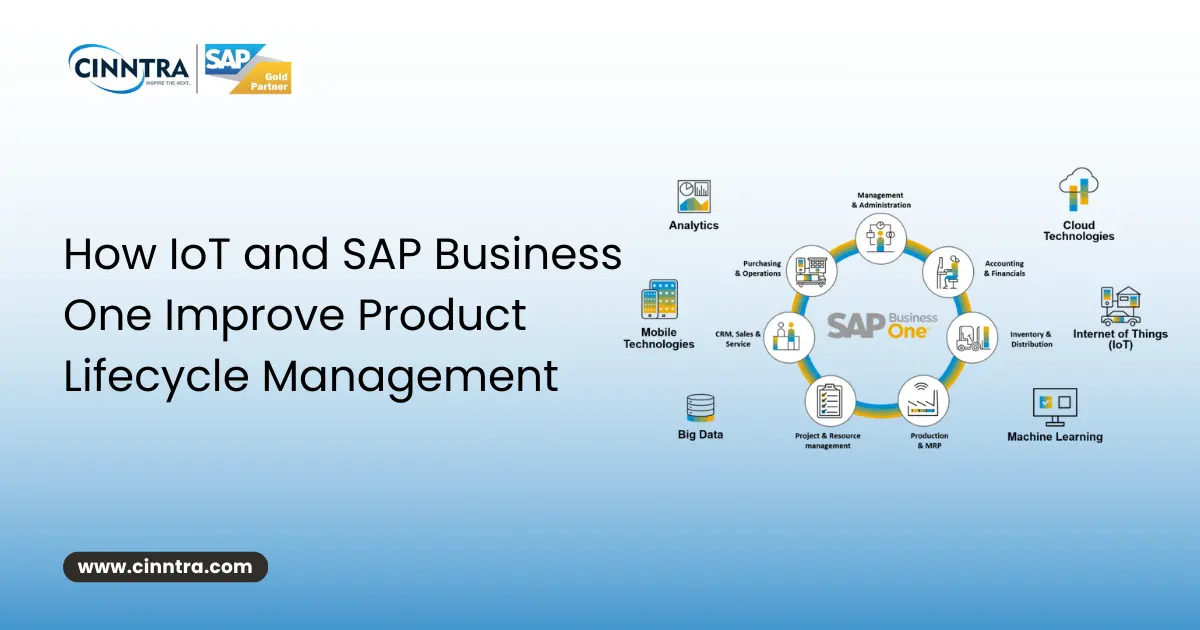NetSuite 2024.2: Enhancing Efficiency in Manufacturing, Warehousing, and Supply Chains

What are some potential challenges with NetSuite?
NetSuite ERP systems can benefit your business by enhancing the automating process to improve productivity. It is a centralized source of all data teams at your company premises.
Implementing NetSuite can be complex as well as challenging because it impacts the whole business process across the whole organization.
It is a suite of software that contains the information to manage every business process in the organization. Further, connecting multiple groups with a single information source for everyone to access. You can get real-time information that allows teams for better decision-making, process efficiency, and improve productivity.
Some Potential Challenges of NetSuite
A NetSuite Cloud ERP implementation can be problematic as it replaces the tedious manual work with a more efficient automated process. The cloud ERP implementation needs solutions to change their ways to adopt automated processes.
Further, implementing NetSuite Services needs redesigning of the processes to amplify the system capabilities way more than an old legacy system to configure the software.
The process generally takes a few months to complete a year cycle in a large organization. Moreover, you can manage a project team to include stakeholders from the various departments of the company.
1. Enhanced Project Planning and Management
The Implementation process contains crucial stages like planning, deployment, development, design, ongoing support, and post-implementation support. The success of NetSuite Services greatly relies on the participation of every stakeholder in every company. It can lead to challenges in keeping all the viewpoints of every member aligned for better systems and budget management.
Get defined roles and clear communication to eliminate conflicting viewpoints before implementing a service. We need to ensure every department works on a common goal to establish a management framework with regular updates and check-ins. Therefore, it results in aligning objectives and mitigating potentials.
Organizations can enhance their project planning and management processes by fostering a culture of teamwork and accountability. It ultimately leads to a smoother implementation experience and better overall results.
2. Data Integrity Assurance
During the implementation of NetSuite ERP, many organizations encountered significant challenges related to data quality and integrity. Poor data quality can obstruct transparency, accuracy, reliability, and real-time inventory visibility. These issues make it difficult for decision-makers to access reliable information required for informed choices. Furthermore, compromised data integrity can hamper employee productivity to spend time rectifying errors rather than focusing on their core tasks.
Therefore, organizations must prioritize data integrity throughout the implementation process. This includes establishing robust data governance practices by conducting regular audits and providing training to staff on data entry best practices.
Organizations can enhance decision-making capabilities by ensuring accurate data and real-time insights. It optimizes operations while delivering a seamless customer experience.
3. Automated Task Execution
Getting accurate inventory management is critical for making sound business decisions. However, it poses significant challenges due to reliance on manual entries that are prone to errors. Research indicates that 40% of surveyed employees spend a quarter of their work week on manual repetitive tasks. This dependence on manual processes increases the risk of human error that can eventually hamper overall efficiency within the organization.
With the help of NetSuite, you can automate redundant tasks can significantly enhance operational performance. Automation optimizes workflows to reduce the likelihood of errors associated with manual entry.
It frees up employees to focus on more strategic initiatives that drive business growth. Organizations can maximize productivity by implementing automation through NetSuite while ensuring exceptional performance across various functions.
4. Change Adaptation Strategies
NetSuite ERP implementations generally encounter resistance to change from employees' hit-and-trial methods to established processes. The introduction of new capabilities can trigger anxiety among staff who may feel uncertain about adapting to unfamiliar technology.
Users may still struggle with technological changes even when the system is designed with logical framework processes to not clearly understand the benefits involved. Further, organizations should implement change management strategies that include comprehensive training programs and open communication channels to address this resistance effectively.
Engaging employees early in the process by soliciting their feedback and addressing concerns can foster a sense of ownership over the new system. Additionally, showcasing quick wins or early successes from using the new ERP system can ease the transition for employees who may be hesitant about adopting new workflows.
5. Optimized Procedures
Implementing cloud-based NetSuite software provides organizations with an excellent opportunity to re-evaluate workflows critically. This evaluation process helps identify inefficiencies associated with outdated software systems that may decrease productivity. Businesses can pinpoint areas where improvements are needed by analyzing current processes to optimize operations accordingly.
Furthermore, implementing a new ERP system allows organizations to clarify roles and responsibilities within teams by creating a more efficient work environment. These moments also present opportunities for engagement in identifying inefficiencies at all levels while transitions may cause apprehension among employees regarding job security or changes in their roles.
You can embrace this change through an ERP implementation which can lead to enhanced operational efficiency for improved organizational performance.
6. Tailored Solutions Alignment
NetSuite ERP implementations frequently face resistance from employees who are accustomed to established processes within their organization. The introduction of new capabilities generally leads to complexity that some staff members may find overwhelming. Users might struggle with adapting to technological changes if they do not find immediate benefits in their daily tasks even though NetSuite is designed based on logical frameworks that aim for efficiency.
Organizations should focus on aligning tailored solutions with specific business needs while actively involving employees in the process to facilitate smoother transitions during implementation. Providing comprehensive training sessions that highlight how new features will enhance daily operations can help alleviate concerns about change resistance.
Additionally, creating an environment where feedback is encouraged allows employees to voice their challenges while contributing ideas for improvement. This collaborative approach eases adaptation to ensure that the implemented solutions effectively meet organizational goals.
7. Skillset Development Initiatives
After successfully implementing NetSuite Services for business operations management, organizations often face challenges related to underutilization due to skill gaps among employees. Many users may not fully understand how to leverage all features available within the system effectively; this lack of knowledge can lead to decreased productivity over time as potential efficiencies remain untapped.
It is essential for organizations not only to onboard skilled employees but also to continuously invest in training initiatives that empower staff members with the necessary skills required for optimal system utilization. Regular training sessions focused on advanced functionalities will help bridge knowledge gaps while enhancing employee confidence in using the software effectively.
Moreover, providing ongoing support through resources such as user manuals or dedicated help desks ensures that employees feel equipped to navigate any challenges they encounter post-implementation successfully. By prioritizing skillset development initiatives alongside system deployment efforts, organizations can maximize their return on investment in NetSuite Support Services.
8. Unrealistic Expectations
When implementing new business software systems like NetSuite Services, organizations must maintain realistic expectations regarding what these systems can achieve. While enterprise resource planning (ERP) software is indeed a powerful tool designed to streamline operations and improve efficiency across various departments, it does not serve as an instant solution for all organizational issues or challenges faced by companies today.
Many businesses experience a notable gap between their initial expectations during implementation and actual results achieved over time; this discrepancy can create frustration among stakeholders who anticipated quicker outcomes from their investment in technology solutions like NetSuite ERP. Mitigating such challenges effectively requires clear communication about what the software realistically offers while setting achievable goals aligned with specific organizational needs rather than vague aspirations for transformation alone.
By fostering an understanding of both capabilities and limitations inherent within ERP systems upfront alongside continuous evaluation throughout usage organizations will be better positioned to achieve sustainable success from their software investments over time.
Overcome The NetSuite Hassles By Premium NetSuite Partner!
NetSuite integration challenges need to understand the process that didn't work effectively. Further, you need to get a seamless data flow to find the full potential of the NetSuite.
Therefore, you need to consider connecting with a NetSuite Implementation partner that can guide you through the whole integration process starting from the planning to ongoing maintenance.
NetSuite integration platform and implementation process can overcome challenges for better integration to optimize business operations that fuel growth.



0 Comments